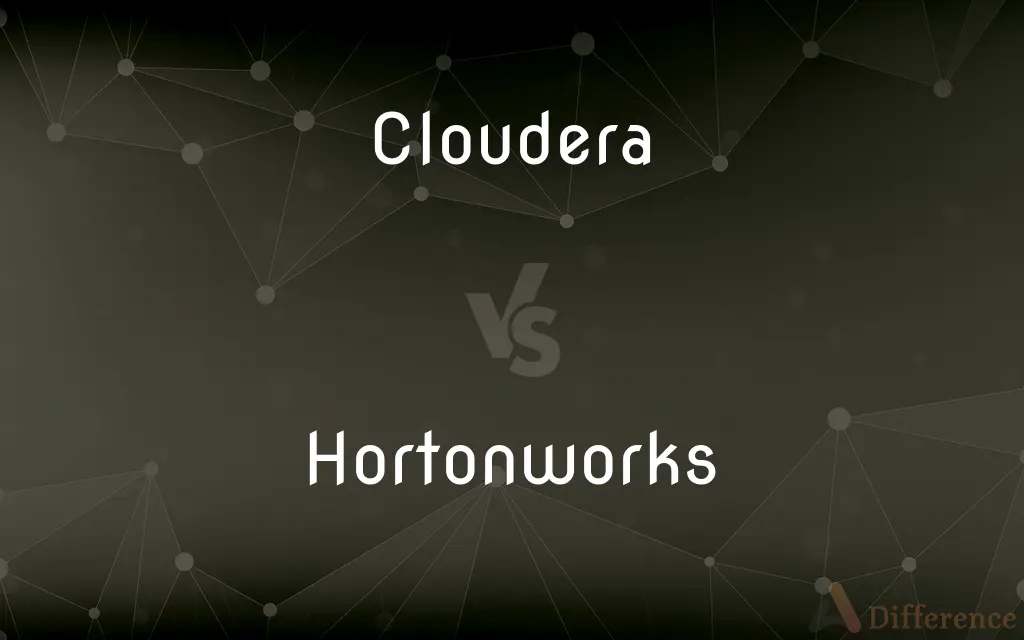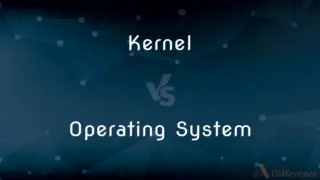Cloudera vs. Hortonworks — What's the Difference?
By Tayyaba Rehman — Published on January 13, 2024
Cloudera and Hortonworks were two leading distributors of Hadoop-based software. They merged in 2019 to form a single entity under the Cloudera name.

Difference Between Cloudera and Hortonworks
Table of Contents
ADVERTISEMENT
Key Differences
Cloudera was founded in 2008, focusing on providing a distribution of Apache Hadoop with additional proprietary components. It was known for its comprehensive, enterprise-focused platform. Hortonworks, established in 2011, concentrated on creating a completely open-source Hadoop distribution, emphasizing transparency and community collaboration.
Cloudera's distribution, known as Cloudera Distribution Including Apache Hadoop (CDH), included proprietary software to enhance Hadoop's capabilities. This approach aimed at enterprises requiring robust, secure, and easy-to-use Hadoop solutions. Hortonworks developed Hortonworks Data Platform (HDP), which remained entirely open-source, catering to organizations preferring open-source purity and flexibility.
Cloudera offered Cloudera Manager for managing and configuring its Hadoop distribution, which was a proprietary tool. It provided a user-friendly interface for Hadoop administration. On the other hand, Hortonworks provided Ambari, an open-source management platform for HDP, aligning with its commitment to open-source software.
Cloudera's business model involved selling software licenses and providing support, training, and consulting services. Hortonworks operated primarily on a support subscription model, offering technical support for its open-source software.
After the merger in 2019, the combined company continued under the Cloudera name, intending to blend the best features of CDH and HDP while advancing the use of big data in enterprise environments.
ADVERTISEMENT
Comparison Chart
Foundation Year
2008
2011
Software Distribution
Cloudera Distribution Including Apache Hadoop (CDH).
Hortonworks Data Platform (HDP).
Proprietary vs. Open Source
Included proprietary components in its distribution.
Completely open-source distribution.
Management Tool
Cloudera Manager (proprietary).
Ambari (open-source).
Business Model
Software licenses, support, and consulting services.
Support subscription for open-source software.
Compare with Definitions
Cloudera
Known for its enterprise-focused Hadoop distribution.
Cloudera's CDH was chosen for its robust security features.
Hortonworks
Focused on an entirely open-source Hadoop distribution.
Hortonworks' HDP was selected for its open-source integrity.
Cloudera
Offered software licenses and professional services.
They subscribed to Cloudera for advanced support and training.
Hortonworks
Operated with a support subscription model.
Their Hortonworks subscription provided extensive technical support.
Cloudera
Merged with Hortonworks to form a single entity.
Post-merger, Cloudera expanded its range of data solutions.
Hortonworks
Provided Ambari as an open-source management tool.
Ambari was used for managing Hortonworks' Hadoop clusters.
Cloudera
Integrated proprietary tools in its Hadoop distribution.
Cloudera Manager streamlined the management of their Hadoop clusters.
Hortonworks
Emphasized community collaboration in Hadoop development.
They contributed to the Hortonworks community for HDP enhancements.
Cloudera
A provider of a Hadoop-based software platform.
The company implemented Cloudera's platform for its big data processing.
Hortonworks
Offered Hortonworks Data Platform for big data solutions.
Hortonworks Data Platform was used for scalable data processing.
Common Curiosities
Did Cloudera and Hortonworks have different business models?
Yes, Cloudera sold software licenses and services, while Hortonworks focused on support subscriptions.
How did Cloudera's CDH differ from Hortonworks' HDP?
CDH included proprietary elements, whereas HDP was entirely open-source.
What was Cloudera known for?
Providing a Hadoop-based software platform with proprietary enhancements.
What was Hortonworks' main focus?
Offering a completely open-source Hadoop distribution.
What management tools did Cloudera and Hortonworks offer?
Cloudera offered Cloudera Manager, and Hortonworks provided Ambari.
Are Cloudera's services limited to big data processing?
While focused on big data, Cloudera also offers analytics and machine learning services.
Was Hortonworks' platform suitable for enterprise use?
Yes, though it was open-source, it was robust and scalable for enterprise needs.
Why did Cloudera and Hortonworks merge?
To combine their strengths and advance enterprise big data solutions.
What made Hortonworks unique in the Hadoop community?
Its commitment to 100% open-source software.
Is Cloudera's software considered user-friendly?
Yes, particularly with tools like Cloudera Manager.
Did Cloudera offer training and consulting services?
Yes, as part of its business model.
What is the current status of Cloudera and Hortonworks?
They operate as a single entity under the Cloudera name after their merger.
How did Hortonworks contribute to the open-source community?
Through active collaboration and community-driven development.
What type of support did Hortonworks provide?
Technical support for its Hadoop distribution.
Can Cloudera's platform integrate with various data sources?
Yes, it's designed for diverse data integrations.
Share Your Discovery

Previous Comparison
Kernel vs. Operating System
Next Comparison
Saturated Solution vs. Supersaturated SolutionAuthor Spotlight
Written by
Tayyaba RehmanTayyaba Rehman is a distinguished writer, currently serving as a primary contributor to askdifference.com. As a researcher in semantics and etymology, Tayyaba's passion for the complexity of languages and their distinctions has found a perfect home on the platform. Tayyaba delves into the intricacies of language, distinguishing between commonly confused words and phrases, thereby providing clarity for readers worldwide.













































